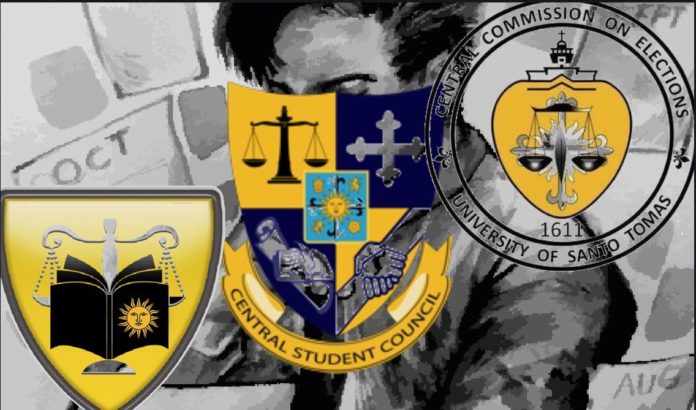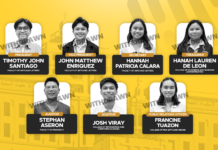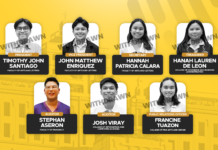DESPITE efforts to pass the Students’ Code and revise the University Students Election Code (USEC) and the Central Student Council (CSC) Constitution this academic year, the current set of officers will be passing lawmaking responsibilities to next year’s leaders.
CSC Central Board Speaker Jonathan Santos said the Central Board, the legislative arm of the CSC composed of presidents of all local student councils in UST, will propose provisions anew for the CSC Constitution after failing to garner enough votes from Thomasians to reach the referendum for charter change that was held last Feb. 5 to 12.
“We cannot revise the consitution on our own. We have to follow the processes. The least we can do now is to provide some basis for the next leaders if they intend to push for the amendment of the constitution,” Santos told the Varsitarian.
At least 50 percent plus one of Thomasian voters must be in favor of the plan to revise the constitution, but Santos said only 200 out of more than 43,000 Thomasians voted in favor of revision in the online referendum.
The previous set of officers in the CSC wanted to revise the constitution to “solidify” the definition of abstain, improve the standards placed for presidential candidates and align the election dates with the latest academic calendar.
If the referendum had ruled in favor of the revision, the final draft of the new constitution would be submitted to the Office of the Rector for approval and would be subject to a plebiscite after it undergoes the deliberation of a constitutional convention and the review of local student councils.
The constitution was ratified on Feb. 27, 2003, amending the 1991 CSC Constitution, after controversies plagued the 2001 CSC elections due to unclear provisions in the charter.
Election code revision
Ivan Pulanco, secretary to the adjudicatory of the UST Central Commission on Elections (Comelec), said drafts to the USEC are almost finished, but completion is not guaranteed this academic year as its approval and ratification will take a long time.
“[Revisions] are ongoing but I will not guarantee completion by this year. We already have finished most of the articles and will pass on the revisions to the next year’s team,” he told the Varsitarian.
Comelec Chairman Arvin Bersonda said revising the campaign period of CSC candidates in the election code would be a priority, citing instances when candidates could not campaign during examination period of local colleges.
“‘Yong priority namin would be[…] the campaign period, para mas malaki ‘yong sakop ng mga [CSC candidates] especially mahirap ngayon mag ayos ng schedule lalo na pag may mga moratorium period ‘yong mga colleges,” he said.
The USEC states that the election campaign period should be limited to 12 school days beginning after the release of the official list of candidates, but the Comelec may prescribe a different period for campaign. This year’s campaign period will last for 10 days, from April 11 to 20.
Bersonda also lamented how the allowed campaign expenses stated in the election code are outdated, as prices of products have gone higher than the value of products in 2011 when the USEC was last updated.
“Financially, mahirap talagang mag-budget lalo na kung ‘yong budget noong 2011 na fixed, ganoon pa rin ‘yong budget na fixed ngayong 2018. E sobrang laki naman na ng difference ng mga bilihin,” he said.
In the USEC, an independent candidate gunning for a CSC post can only spend 50 centavos for each student enrolled in the University, while political parties can spend up to P2.00 for every student.
For Dennis Coronacion, chairman of the UST political science department, Comelec should not have the power to regulate political parties, as it could limit the student body’s number of choices.
“It’s not their job. Do you see Philippine Comelec doing that? Isinuspindi na ba diyan ang Liberal Party just because hindi nakapag-submit ng listahan ng mga members?” he said.
Bersonda said giving more “benefits” to political parties would be among the revisions in the election code.
“Kasi nga for me honestly nakukulangan din ako sa mga kaya nilang gawin kasi I think we’re restricting them actually,” he said.
Muntinlupa Regional Trial Court Judge Philip Aguinaldo, adviser of Civil Law Comelec, said the election code should be revised every five years.
“New technologies and current events and practices are introduced even before we are aware of them, that can affect voters’ preferences, indifference or involvement,” he said in an email interview.
Since local Comelec units have different problems and ideas, Bersonda said clashing of opinions about the proposed changes becomes a problem in the process of revising the USEC.
“So we’re trying to have a common ground when it comes to the revision and hindi naman kasi ganun kadali… we have to make sure na agreed lahat ng bodies,” he said.
Comelec withheld the supposed revision of USEC in 2015 due to “internal conflicts.”
The proposed revisions in the election code must be first presented by Comelec to the CSC Central Board and shall be approved upon two-thirds vote of all Central Board members.
Students’ Code
CSC Secretary Therese Gorospe, who is also the council’s acting president, said the Central Board is consolidating the comments of the regents of all colleges and faculties in the proposed Students’ Code after it was submitted to the regents for reviewing April last year.
“We are in the process now of consolidating sa [Central Board] tapos ipapasa na lang sa authorities for approval,” she said in an online interview.
Santos said the code could be on the Rector’s table “anytime soon” after the comments and revisions are consolidated, but he said the process should done thoroughly to “lessen the loopholes.”
“[The Rector] is in fact the one telling us to rush it too so we can present the revised version,” he added.
Gorospe said there should be continuity in revising the Students’ Code as passing on the revision to new sets of officers slows down the process.
“Kumbaga yung mga bagong umuupo, walang sapat na kaalaman kung nasaan na. Kasi hindi nata-transition nang maayos,” she said.
The proposed Students’ Code, initially called the Magna Carta of UST Students, has undergone a series of revisions when it was first drafted in 2004, but former rector Fr. Ernesto Arceo, O.P. resigned before he could sign it. With the change of administration, the revision process of the students’ charter started anew until it reached the Office of the Vice Rector for Academic Affairs in February 2016. Again, it was returned to CSC for further revisions.
The Students’ Code, which includes provisions on academic rights, freedom of expression, the right to information, participation in policy making, the right to organize and the right to due process, will be submitted to the Office of the Rector for approval after securing the nod of the faculty, the vice rectors, the Council of Regents and the Academic Senate. The code also has to be submitted to a student plebiscite.
‘Revision of charters necessary’
Coronacion said it is necessary to revise the charters soon to address the problems that arose in last year’s elections.
“I think there’s a need [to revise] because the revision will be able to address the issue that took place last year wherein we saw that the [Comelec] included in the counting of the votes the abstention, which is not usually the case,” he said.
Calls to revise the USEC and the CSC Constitution have emerged after lone presidential candidate Steven Grecia questioned the validity of “abstain” winning against candidates for CSC in April 2017.
Grecia claimed that the candidates with the most number of votes should have been proclaimed winners due to the absence of a rule defining “abstain” in both charters.
On July 24 last year, the Central Judiciary Board, the judicial arm of CSC composed of the CSC adviser, legal consultant of the Office for Student Affairs, chief of the Legal Aid Clinic of the Faculty of Civil Law, president of the Canon Law Society and a CSC representative, issued a resolution siding with Grecia and ordering the Comelec to proclaim the winners with the highest number of votes.
The following month, Comelec proclaimed Steven Grecia, Gabriela Sepulchre, Daveson Nieto and Richard Javier as president, vice president, treasurer and auditor, respectively, but they rejected the posts and filed resignation letters on Sept. 11. with reports from Job Anthony Manahan











